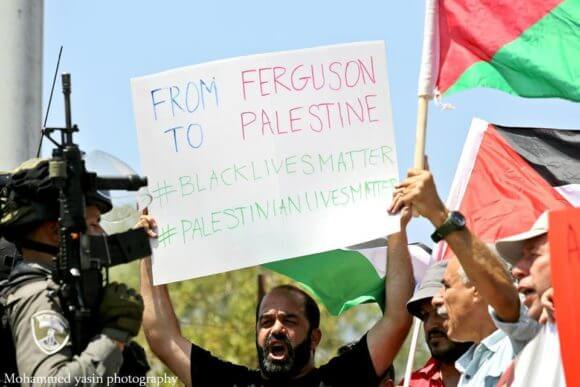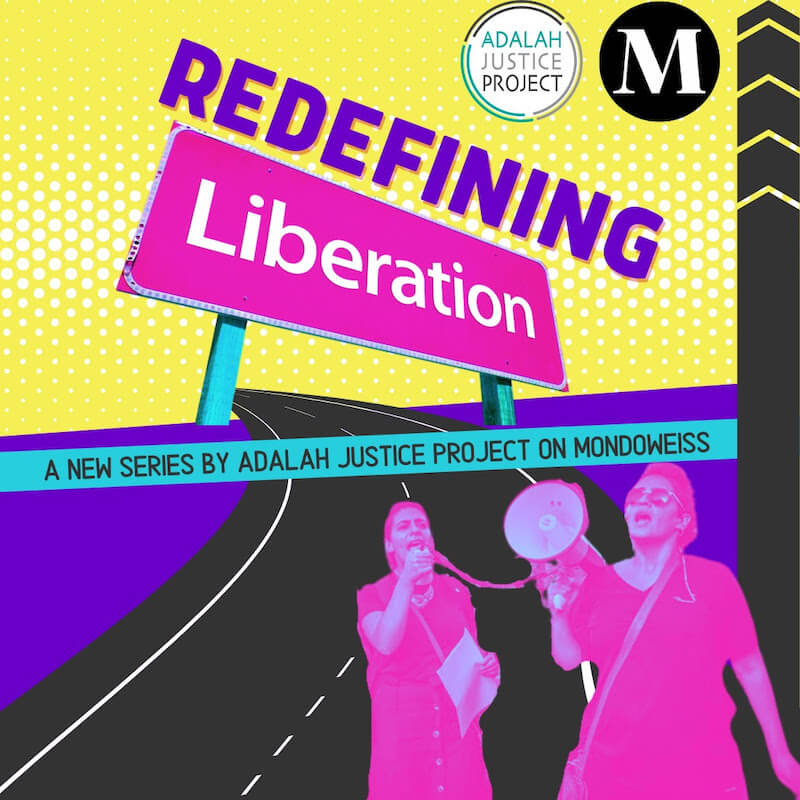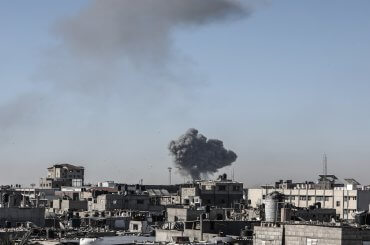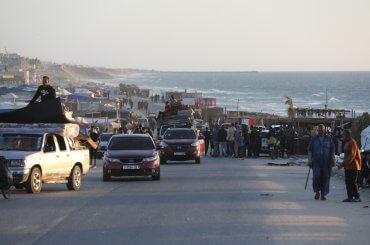Zionists are working hard to decouple the struggle for racial justice in the United States from Palestinian liberation. Last month, The Atlantic ran a long diatribe against the left’s criticisms of Israel under the title “Palestine is not Ferguson.” More than seven years since the Ferguson uprising, I can still feel its reverberations. I will never forget the tankers and tear gas deployed to the neighborhoods of suburban St. Louis to occupy people calling out for justice. No group was impacted more than Black America, but Ferguson changed the Palestine movement forever and infused our struggle with new life and vision. Perhaps it is the power of this lasting legacy that fuels an ongoing assault on Black-Palestinian solidarity and on the left’s commitment to collective liberation.
Israeli officials and their Zionist accomplices in the United States have spent considerable energy strategizing about how to combat the “challenge” of Palestine being a part of the broad wave of organizing for progressive social change. In a 2015 opinion editorial, the Anti-Defamation League admonished Angela Davis for drawing connections between Palestine and Ferguson claiming there is “no rational connection between the challenge of racism in America and the situation facing the Palestinians.” In 2019, the Reut Group, formerly known as the Reut Institute, a non-profit organization that works closely with the Israeli government, issued a policy paper outlining the dangers posed by “intersectionality” for Israel advocacy. A memo by the Israel Action Network in 2019 warned of the “harmful abuse” of intersectionality “to exclude Jews from progressive activist circles.” When pro-Israel entities say Jews, they mean Zionists. The piece in The Atlantic posits that the comparison between Palestine and Ferguson is not based on any specificity, and that is what allows “metaphors to bloom.”
The Palestine-Ferguson metaphor is salient to this day because of specificity. Palestinian and Black American solidarity was forged by our shared experience as targets of state violence and repression.
To the contrary, the Palestine-Ferguson metaphor is salient to this day because of specificity. Palestinian and Black American solidarity was forged by our shared experience as targets of state violence and repression. When our young people are murdered by the state, we see the connections. We mourn together. We cling to each other in the knowledge that we are not alone. It is because tanks, tear gas, and tactical warfare is called on when we rise up against these killings, the metaphor blooms. It is grounded in tragic specificity.
This solidarity is also a lens that helps each community understand its own conditions more clearly. Palestinians through the prism of Black struggle understand the Israeli colonial project as part of U.S. imperialism. Black Americans see in Palestine their position as a colonized people connected to oppressed people around the globe. In both instances, we realize we are not alone in our fight for freedom.
Cori Bush is the epitome of the threat of intersectionality to Israel apologists. Through her activism in Ferguson and her friendship with Bassem Masri, a Palestinian who was on the front lines in the fight for justice after the murder of Mike Brown, Rep. Bush is unwavering in her support of Palestinian demands. She has voted against military funding to Israel at every opportunity since she took office in January 2021. It’s not an accident that it was organizer and activist Cori Bush who spearheaded a talk by Angela Davis in St. Louis in 2015 as part of The Truth Telling Project where Dr. Davis explained, “The Ferguson struggle has taught us that local issues have global ramifications.” [1] In May during the height of the uprisings in Palestine, Cori Bush tweeted, “The fight for Black lives and the fight for Palestinian liberation are interconnected. We oppose our money going to fund militarized policing, occupation, and systems of violent oppression and trauma.”
The legacy of the Ferguson Intifada on the Palestine movement and a commitment to joint struggle were amplified many times over in the wake of the Palestinian Unity Intifada in May. We are still witnessing how Palestinian resistance earlier this year is translating into organizing efforts in the United States. A prime example is the historic launch of No Tech for Apartheid, a campaign to support the over 1,000 Amazon and Google employees who are demanding that their employers’ end a contract with the Israeli military.
A seemingly unremarkable show of solidarity by the DC chapter of the Sunrise Movement received harsh blowback from Zionists last month. The DC affiliate of Sunrise, an organization of young people fighting for environmental justice, refused a speaking slot at a voting rights and DC statehood rally because of the presence of at least three Zionist organizations in the event coalition. In a statement, Sunrise DC declared, “Zionism is not a theoretical concept; it is the ideology that has led to Palestinians being violently pushed out of their homes since 1948.” The Zionist establishment’s reaction was swift and ferocious as Zionist organizations launched an attack on Sunrise DC and the national leadership of the five-year old organization, claiming the decision was antisemitic. Zionist powerbrokers went to far as to threaten to sow division within Sunrise nationally over the decision and to call on leading members of Congress to denounce them.
The Jewish Council for Public Affairs, JCPA, was one of the groups named by Sunrise DC that led to their decision to withdraw from the voting rights rally. In 2018, the JCPA paired up with the Reut Group to brainstorm ways to combat intersectionality. Then JCPA CEO David Bernstein wrote in 2016 that “publicly attacking intersectionality and its adherents is not likely to do much damage” and “can paradoxically have the effect of popularizing their views.” He abandoned that approach in this instance. With Sunrise DC’s principled stance on Zionism, JCPA and its allies defaulted to their tried and tested mode of attack: false charges of antisemitism and bullying.
You can understand their panic. The decision by young organizers to refuse to work with Zionists and to insist that Israel is a colonial project opens a floodgate. The question they must have anguished over is: How many more progressives will make the decision to exclude Zionists over their racism against Palestinians?
Establishment Zionist organizations like JCPA have traditional power that can threaten the Sunrise Movement’s environmental agenda. The Reut Group report acknowledges this dynamic stating that Palestine organizing is “predominantly grassroots while the organized Jewish community tends to be more ‘top-down.’” Zionist leaders were ready to have Democratic leaders in Congress denounce Sunrise, jeopardizing their legislative agenda on climate change. They backed Sunrise into a tough corner, but these instances of overreach radicalize people and bring them further into alignment with Palestinian demands for freedom. Earlier this year, Sunrise Movement collaborated with Adalah Justice Project on a video about the uprisings in Palestine that affirmed their commitment to collective liberation. We will continue to build on this shared vision.
The power of the Palestine movement is different from the traditional power wielded by Zionist organizations, and it can’t be replicated artificially through bullying tactics. Our power is a combination of principled values, built-in critique of state violence, and authentic relationships nurtured in grassroots spaces. It is impossible for traditional power to conjure up organic solidarities. It turns out that playing the bully for apartheid and state violence in the name of Jewish “safety” alienates progressives, including many Jews, and tends to bolster solidarity with Palestine. The strength of the movement for Palestinian freedom comes from being on the right side of history in authentic relationships with a lattice of social justice movements tied together in the belief that no one is free until all of us are free.
Notes
- Davis, Angela, Freedom is a Constant Struggle: Ferguson, Palestine, and the Foundations of a Movement, p. 90
This article is part of the Mondoweiss series Redefining Liberation by the Adalah Justice Project on moving past the narrow definition of national struggle and embracing liberation strategies grounded in the rich Palestinian legacy of joint struggle and transnational solidarity. With strong connections to radical organizing happening in their Palestinian homeland, Adalah Justice Project‘s vision of transformation is rooted in the understanding that race, gender, sexual orientation, and class all intersect to create the conditions of our current reality. AJP is a Palestinian organization that works to transform public discourse and U.S. policy on Palestine through public education, coalition-building, and advocacy within all realms of political activity, from the grassroots to Capitol Hill. Learn more about AJP’s work, and follow the entire series here.




AND Palestine is the Native American experience: in the 50’s the U.S. government tried to erase the Native Americans as a society – they were attempting to commit politicide.
https://www.apmreports.org/episode/2019/11/01/uprooted-the-1950s-plan-to-erase-indian-country
“In the 1950s, the United States came up with a plan to solve what it called the “Indian Problem.” It would assimilate Native Americans by moving them to cities and eliminating reservations. The 20-year campaign failed to erase Native Americans, but its effects on Indian Country are still felt today.”
Different tactics, same desired outcome: call the Palestinians and the human rights organizations that support their rights “terrorists”.
Last month, The Atlantic ran a long diatribe against the left’s criticisms of Israel under the title “Palestine is not Ferguson.”
Here’s the link: https://www.theatlantic.com/ideas/archive/2021/10/israeli-palestinian-conflict-ferguson/620471/
“Israel is unusual in that it existed as an idea before it existed as a nation-state. Today, it is also unusual, even remarkable, for lacking internationally recognized borders—an indispensable marker of sovereignty—and for decades it has been depriving Palestinians in the occupied territories of political rights and freedom.”
Go figure.
The Atlantic ran an article criticizing the Left for being critical of Israel. The Atlantic has ads for FLAME, (Facts and Logic About The Middle East). That is false advertising. Israel commits ethnic cleansing of Palestinians by forcing them off their land to make room for settlers, destroys olive trees and uses a certain amount of water from Palestinians’ homes to irrigate their farms. Israel claims to be the most successful nation in the world in desert farming and helps other nations in desert farming.
The BLM movement has so far not articulated legislative or policy decisions. Conveying that America is racist and ignorant has created blowback, as indicated in Virginia and strength of Republicans.
Had rocks at police been accepted as a form of resistance in Ferguson, BLM would be in trouble.
Until Arab citizens emphasize equality under law, building bridges to Native Americans seems especially appropriate.